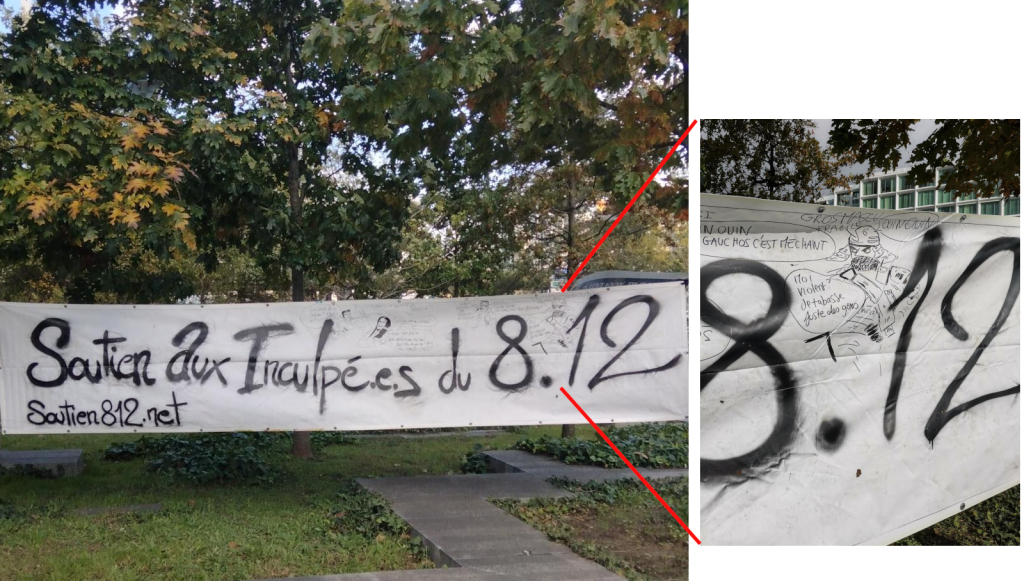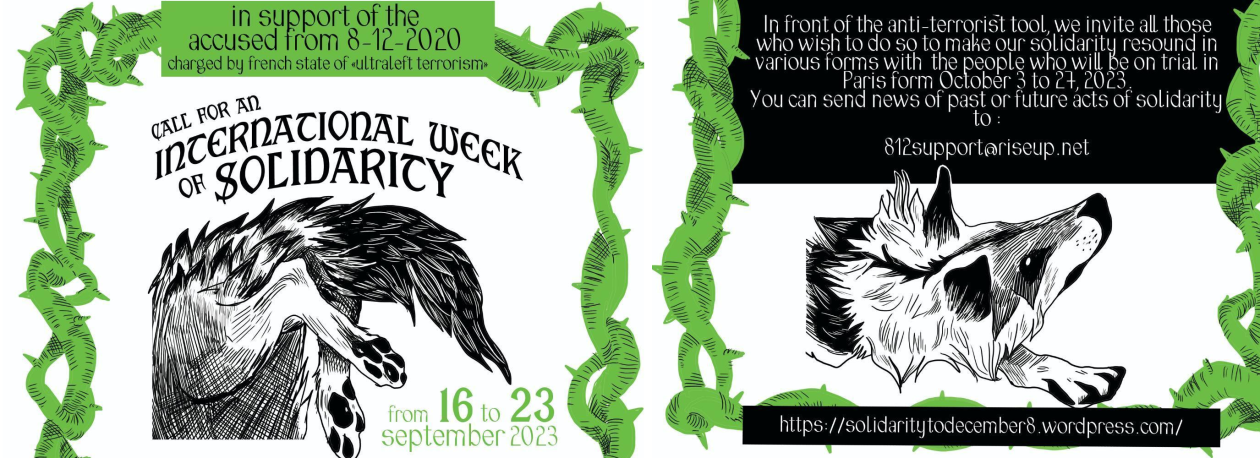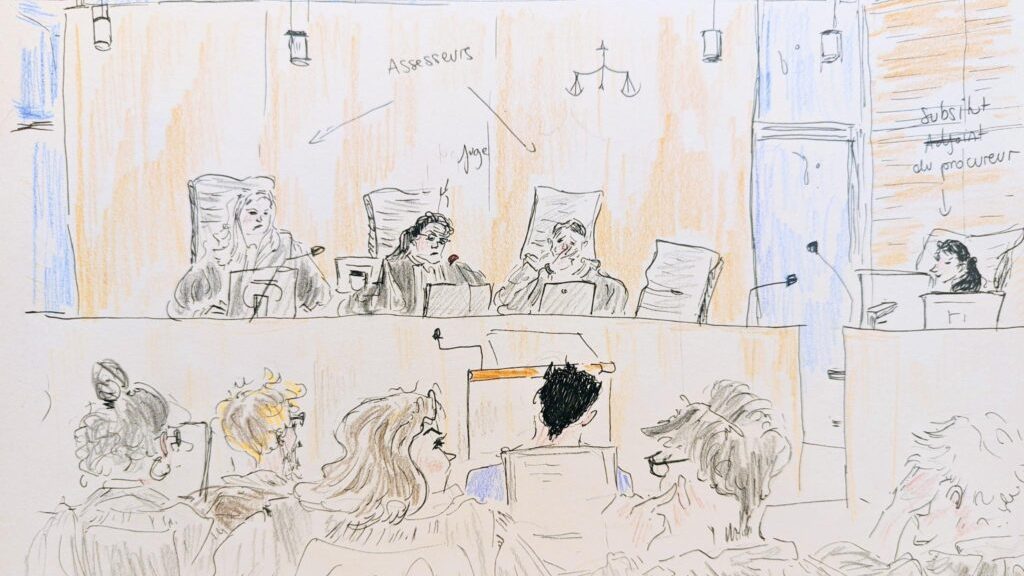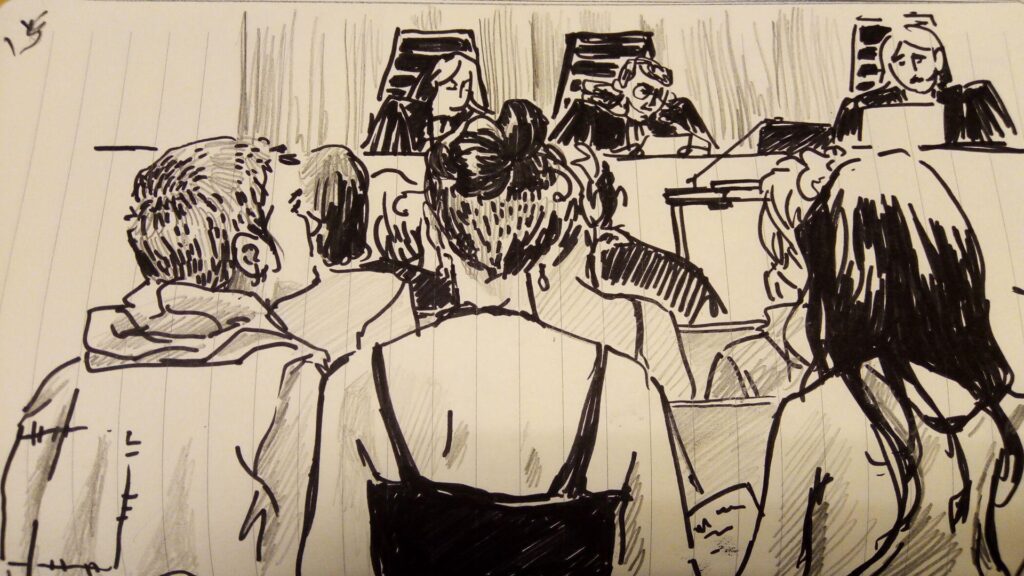from Paris-luttes.info
Today, it was the turn of B., S. and F.’s lawyers to plead.
The day began at 11 a.m. on the courthouse square, where a gathering was held in support of the defendants! Speeches were made by various groups supporting the December 8 case and other anti-terrorism cases, by relatives of the defendants, by feminist groups, and by groups from the mutual aid, truth and justice network (Réseau d’Entraide Justice et Vérité : network of collective organizations against violence and state crimes, NdT)… It was ended in song, while delicious wraps of support were enjoyed by the two hundred people present.

Inevitably, the courtroom was full to bursting, with a good fifty people unable to get in but staying out in front anyway.
Pleadings
The lawyers point out that all the defendants have experienced the whole procedure very violently, at the end of which we just find the spectre of ultra-left-wing terrorism. But why, how could they be terrorists? Where is the plan? Where is the intention? In May 2020, when the investigators saw these facts, the project could not necessarily be ruled out. But afterwards, throughout the surveillance, the investigators clearly saw that there was no plan to continue with these supposedly problematic acts. We don’t arrest them at the time, because we don’t think they’re doing anything that dangerous, and to wait and see what their plans are. One of them is denied accreditation for several months, probably because he or she is on file, then miraculously obtains accreditation, all of a sudden, in the hope that its use will advance the investigation. But no, it doesn’t, he doesn’t do anything with it except for professional use. So, we see that there’s no project and we arrest them, considering that in May 2020, yes, these were very, very dangerous facts.
They set out to prove that there was no plan, no terrorist criminal association, that the airsoft games were not paramilitary training, that the defendants had not been inspired by a charismatic leader to arm themselves and get their hunting licenses even before meeting this so-called leader. Finally, no, F. did not go to Rojava with the aim of returning to import the armed struggle, that this was pure fantasy on the part of the DGSI.
As on the previous day, it is explained that they acknowledge having produced explosives (which they have always called “firecrackers”, but given that firecrackers explode, the word chosen by the courts will be “explosive”) for one of them, and having played airsoft for the other, but they dispute the narrative surrounding these acts. There is no tracking, no named or supposed target.
They show the errors and biases of the investigation, with a few examples. A handwritten notebook with descriptions of paramilitary training, when in fact it was the notebook of a cop who had come to search. The one from an expert saying he’d never heard of this explosive recipe in Europe, whereas a visit to YouTube shows that it’s used all over the French countryside. Learning that the recipe is very complicated to make, whereas the basic product used to make firecrackers can explode in a wide range of conditions, and without using the right recipe. That having anarchist brochures makes you a terrorist.
The investigation was carried out solely for the prosecution, making it an unfair trial. They pointed out that all the defense’s requests (access to videos of police custody, sound recordings, hard disks, etc.) had been refused during the investigation and at the hearing; and that the judges’ questions suggested that they had been made only to confirm the DGSI’s construction. Certain elements are not in the file, including 99% of the wiretaps, and documents have even disappeared, even though they were in the hands of the investigators. As one of the lawyers put it: “it’s hard to contradict the emptiness [of the investigation]”.
The defense deconstructed the terms “terrorist” and “ultra-left”: the first is a term that governments use to designate an enemy with whom no dialogue is possible (and who can therefore be deprived of certain rights in the process); the second has no precise definition, but is a sign that the defendants are being tried for their political opinions. The defendants have political opinions, but there has been no intimidation or terror, which is what is supposed to happen in a terrorist criminal association.
The pleadings also focus on the conditions of detention, and in particular LibreFlot’s 16 months in solitary confinement and 43-day hunger strike to get out. They all asked for acquittal on the charge of terrorist conspiracy. They are asking that if the defendants are sentenced for the offences they admit to (illegal possession of weapons, manufacture of explosives, refusal to use encryption codes, etc.), they be recharacterized as non-terrorists, and that no ban on carrying weapons or registration in the criminal record be imposed, so that those who practice shooting sports or fireworks can continue to do so. They also demanded that they should not be registered on the FIJAIT (Fichier des auteurs d’infractions terroristes, terrorist offenders file, NdT), and that sentences should be such as to prevent them all from returning to prison, taking into account the 3 years they have just (very badly) lived through.
The defendants speeches
Finally, the defendants take the stand one after the other. They reaffirm that this “disproportionate judicial storm” has been ruining their lives for three years, and that they are not terrorists. They express their fear of being judged, of being branded terrorists, and of having to carry this stigma for years to come. They need time to rebuild their lives, and aspire to “live in harmony with each other”, and are “proud of the struggles waged and the ideas defended”. “The future is not violence but solidarity”!
Despite the chairwoman’s reprimands, the audience applauded each speech, concluding with shouting “LIBERTÉ! LIBERTÉ!” (FREEDOM, FREEDOM!)
Deliberation is scheduled for Friday December 22 at 10am.



